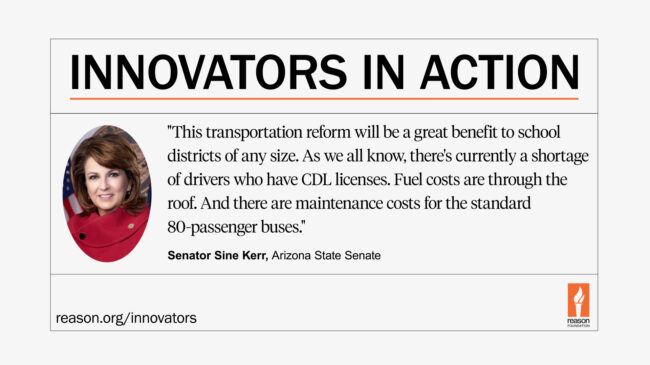In 2022 Arizona adopted a new student transportation law to provide schools and families with more flexible busing options. The legislation will expand schools’ ability to use 11-to-15 passenger vans and eliminate the requirement that all drivers hold a commercial driver’s license, all while ensuring student safety.
Reason Foundation’s Ari DeWolf and Christian Barnard recently sat down with the bill sponsor, Arizona State Senator Sine Kerr, to discuss the new policy and how she believes removing unnecessary busing regulations will help families and schools across the state.
DeWolf: Before we talk about the substance of your K-12 transportation policy reform from the 2022 session, would you share a little bit about your background before becoming a member of the Arizona State Senate? What got you involved in public policy and in public life?
Senator Kerr: Yes. Thank you so much for that. I always love to talk about my background because I think it is relevant to any American citizen who has even had a fleeting thought of becoming an elected official. My husband and I are longtime dairy farmers in Buckeye, Arizona, which is about 35 miles west of Phoenix.
Through agriculture, I got involved in leadership programs from the Arizona Farm Bureau with United Dairymen. I began taking leadership classes and anything else I could get my hands on. That’s where I learned to love engaging in public policy. I spent a lot of time at the state legislature meeting with members and advocating on behalf of agriculture.
Early on, it was apparent to me. that government regulation could really hurt you – and hurt you quickly. I understood how critical it was to have decision-makers who understood the impact each and every piece of legislation could have on farmers and ranchers, not only in Arizona but across our country. That carried over for me a love for policy and a recognition of how critical it is to have decision-makers who understand their impact on small businesses and other entities and folks trying to do what they do best.
“Early on, it was apparent to me that government regulation could really hurt you – and hurt you quickly.”
Sen. Kerr
DeWolf: What first made you see the need to reform the way K-12 institutions are incorporating or utilizing 11-to-15-passenger vans to meet students’ transportation needs?
Senator Kerr: This was a result of a first-of-its-kind in-the-nation grant program put into effect in Arizona last year. Through the granting application process, they found a large number of students came from rural schools. Lack of transportation flexibility was a frequently made comment, especially in those areas.
Great Leaders, Strong Schools, asked if I would be interested in the issue. I said, “Absolutely.” I represent a rural area. I raised our family in a rural area and they all attended, what I call, a small, rural farm school. Oftentimes, in rural areas, the roads are not maintained like in our urban areas. There are long distances that many of our bus drivers had to go, either to pick up students or deliver them at the end of the day. It was, in my opinion, a no-brainer and very common sense. We would offer flexibility to districts wanting to take this up. I heard from Reservation school officials about how this could be beneficial. And when, in our urban areas, there is a route that didn’t have a whole lot of students, then they could use this type of vehicle and be way more efficient.
“These vehicles are already being utilized by sports teams and other groups. They have already been utilized to safely transport children for many, many years. This new law just allows these vehicles to be used on regular bus routes.”
Sen. Kerr
Most importantly, are the safety features added to the program. These vehicles are already being utilized by sports teams and other groups. They have already been utilized to safely transport children for many, many years. This new law just allows these vehicles to be used on regular bus routes.
Barnard: I think every state needs these flexibility measures, especially as school choice proliferates. Students are zigzagging everywhere, trying to attend the school best for them. Yellow school buses are great, but they’re not able to serve every student, in every case. And they can be really expensive for districts trying to pick up only four or five students. So where do you see the benefits of this legislation? How do you see it affecting school choice students in Arizona?
Senator Kerr: There’s a great benefit to school districts of any size. As we all know, there’s currently a shortage of drivers who have CDL licenses. Fuel costs are through the roof. And there are maintenance costs for the standard 80-passenger buses.
For our school choice students, it provides an opportunity for those who wouldn’t have it. Parents could not always secure transportation for their children. This could be organized in those circumstances. I heard from a wonderful woman who oversees a school for autistic students and she expressed how beneficial this will be. Again, providing that flexibility too often lacking in public policy. And helping the drivers, who have to go through all the safety training with only one exception – they don’t have to have a CDL.
Barnard: What kind of pushback did you get to the legislation? What kind of pushback can policymakers in other states expect if they introduce similar legislation?
Senator Kerr: The biggest pushback was around safety concerns. And, again, it’s clearly outlined in the bill. Our Department of Public Safety, which oversees our current training for our bus drivers and bus safety, will oversee this program as well. The same agency dealing with safety and rulemaking on all the important safety decisions will still make decisions for these 11-to-15-passenger vehicles. There is also the Student Transportation Advisory Council overseeing the use of any vehicles. They will work in tandem. They are able to offer opinions and oversight on safety features as well. That was the biggest pushback I got. And really, I argued against that because it simply isn’t the case. It will be a very safe program.
The other pushback was with insurance concerns. If a district doesn’t have an insurance company agreeing to back them, then obviously, they are unable to utilize this program. It’s an opt-in opportunity, it’s not required. Hopefully, most of the districts needing the flexibility are be able to work with their insurance agencies to establish a good plan.
Barnard: What interest have school officials shown so far? You said school districts that were applying for the grant wanted more flexibility. Do you think there’s going to be a lot of take-up by districts in the next year or two?
Senator Kerr: I do. Many rural districts, and even our larger, urban districts, have thanked me for the opportunity to have more tools in their K-12 transportation toolbox. I’m excited to learn how districts utilize this refreshing flexibility.
Barnard: And that makes sense because schools are already using them for things like transporting the tennis team or debate club. There are some federal barriers to purchasing vans for school transportation, but many districts already have these vans and they’re just sitting in the lot. Do you think many districts already have 15-passenger vans?
Senator Kerr: I do. And with the bus driver shortage, some bus routes get canceled. I can’t imagine, as a parent, getting a message while running out the door that says, “Oh, I’m sorry, we don’t have enough drivers. We won’t be running your route today.” It creates quite a bind for families. We’re going to alleviate a lot of bus schedule challenges because again, those drivers won’t have to have a CDL. But they are trained. The students are in good hands. The vehicle will have all the required safety features. It’s going to be a win-win for everyone.
“I can’t imagine, as a parent, getting a message while running out the door that says, ‘Oh, I’m sorry, we don’t have enough drivers. We won’t be running your route today.’ It creates quite a bind for families.”
Sen. Kerr
DeWolf: As Christian referenced before, this is an idea policymakers in other states are likely to take up. Do you have any advice on how your leadership style allowed you to shepherd this bipartisan bill into law?
Senator Kerr: Yes. I guess I just bring the way I’ve always conducted myself. I’ve always been a good listener and, especially with all the bills we go through, I’m always listening to the pros and the cons. I feel it’s in that tension, it’s in that discussion, where we really craft the best legislation for the state or for that group a bill is affecting. I used to resist the tension and the fight. You can be at odds with members in your own caucus or members in the party opposite. I finally learned to embrace that tension, because again, that’s where the best legislation is hammered out and ideas emerge that you didn’t consider. Perspectives from all angles are really important. They can be put into a bill, making a good bill, a great bill.


